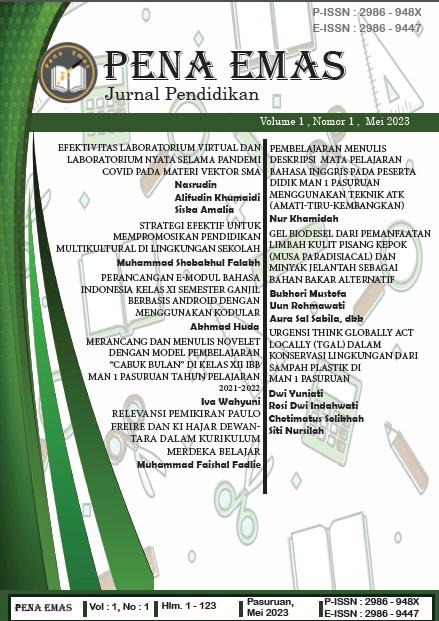Efektivitas Laboratorium Virtual dan Laboratorium Nyata selama Pandemi Covid-19 pada Materi Vektor SMA
DOI:
https://doi.org/10.64688/jpe.v1i1.1Kata Kunci:
Covid-19, Real Laboratories, Virtual Laboratories, Vector.Abstrak
Pendidikan selama pandemi Covid-19 harus tetap berlanjut dengan segala konsekuensi dan keterbatasan. Kebijakan Pembelajaran Jarak Jauh merupakan solusi yang diberikan oleh pemerintah dalam kondisi ini, salah satu madrasah di Jawa Timur yakni MAN 1 Pasuruan melaksanakan pembelajaran dengan pembatasan jumlah siswa, sehingga guru dituntut untuk membuat pembelajaran dengan dua metode, yaitu online dan offline. Penelitian ini bertujuan untuk membandingkan efektivitas pembelajaran dengan Laboratorium Virtual berupa simulasi dan animasi interaktif untuk kelas online dan Laboratorium Nyata untuk kelas offline pada materi vektor. Metode penelitian yang digunakan adalah metode campuran dengan membandingkan efektivitas hasil belajar siswa, hasil kuesioner, temuan selama proses pembelajaran, dan wawancara dengan perwakilan siswa dari tiga kelas dengan total sampel sebanyak 89 orang. Analisis menunjukkan adanya perbedaan hasil belajar antara kelas online dan offline. Kemudian siswa di kelas offline dapat berkomunikasi lebih banyak dengan guru, berlatih keterampilan motorik, dan rentang skor siswa tidak jauh, sedangkan kelas online dapat lebih memahami dengan belajar mandiri, kurangnya komunikasi dengan guru, dan rentang skor siswa sangat jauh.
Kata Kunci: Covid-19, Laboratorium Nyata, Laboratorium Virtual, Vektor.
Abstract
Despite the limitations and consequences brought about by the Covid-19 pandemic, education must continue. In this situation, the government has introduced the Distance Learning Policy, which has led to one madrasah, namely MAN 1 Pasuruan in East Java, to limit the number of students. As a result, teachers were required to employ two methods, namely online and offline, in creating learning experiences. The study conducted aims to compare the effectiveness of learning through Virtual Laboratories, which make use of simulations and interactive animations, for online classes, and Real Laboratories for offline classes, in teaching vector material. The research was carried out using a mixed method, which involves the comparison of the effectiveness of student learning outcomes, questionnaire results, findings during the learning process, and interviews with student representatives from three classes with a total sample of 89 people. The analysis of the data showed a significant difference in learning outcomes between online and offline classes. Students in offline classes were able to communicate better with teachers, practice their motor skills, and achieved scores that were more uniform. On the other hand, online classes were able to achieve a better understanding through self-learning, although they lacked communication with teachers, resulting in a wider range of student scores.
Kata Kunci: Covid-19, Real Laboratories, Virtual Laboratories, Vector.







